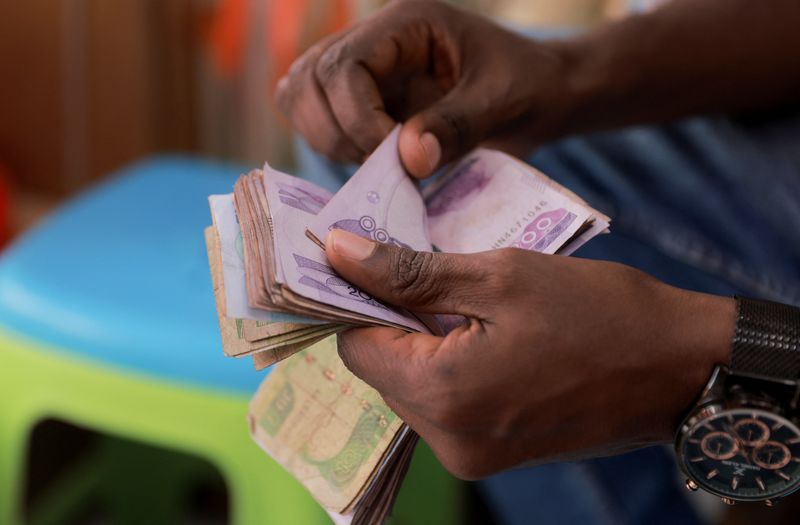By Dawit Endeshaw
ADDIS ABABA (Reuters) -Ethiopia's central bank floated the birr currency on Monday, a move it hopes will secure International Monetary Fund (IMF) support and enable progress on a long-delayed debt restructuring.
The birr's value against the U.S. dollar slumped by 30% to 74.73 per dollar, the country's biggest lender, Commercial Bank of Ethiopia said. The currency had been trading at 57.48 birr to the dollar on Friday.
The Horn of Africa nation, which has been struggling with soaring inflation and chronic foreign currency shortages, became the third economy on the continent in as many years to default on its government debt last December.
It has been in talks with the IMF to establish a new lending programme after the last programme, agreed in 2019, was abandoned due to conflict in the northern region of Tigray. Negotiations resumed after a November 2022 peace deal.
The central bank said in a statement on the float that "banks are henceforth allowed to buy and sell foreign currencies from/to their clients and among themselves at freely negotiated rates" and that it would only make "limited interventions" in the FX markets going forward.
The reforms were initially announced by Prime Minister Abiy Ahmed late on Sunday.
Central bank governor Mamo Mihretu said in an online video that, as part of the reforms, Ethiopia would get $10.7 billion in external financing from the IMF, the World Bank, and other creditors.
"The IMF and World Bank are both providing exceptional and front-loaded funding support that will be among their highest such allocations in the African continent," he said.
Importers, who had been relying on the black market to secure dollars, expressed relief at the central bank's move.
"Now I don't need to go to black market to buy or sell dollars. It is now a market-based foreign exchange regime, so (we) will buy or sell based on the legal channels," said a businessman in the capital Addis Ababa, who did not want to be named.
The IMF did not immediately respond to a request for comment. The fund's executive board was scheduled to meet on Monday to discuss a new programme for Ethiopia, Bloomberg news agency reported. Reuters could not confirm the meeting.
Ethiopia's main $1 billion dollar government bond edged higher to reach 75.42 cents on the dollar by 1400 GMT, its highest level since early 2022.
The United States welcomed the shift.
"Market-based FX is a difficult, but necessary step for Ethiopia to address macroeconomic distortions," the U.S embassy in Addis Ababa posted on social media platform X.
Ethiopia, Africa's second-most populous country, requested a debt restructuring under the Group of 20's Common Framework process in early 2021, but the war in Tigray slowed progress.
The government previously announced other reforms that analysts say are linked to the IMF talks, including adopting an interest rate-based monetary policy earlier this month.

Some said the longer-term impact of the devaluation was less clear.
"The consequences of exchange rate regime change will take some time to be reflected on the economy," Abdulmenan Mohammed, an Ethiopian economic analyst based in Britain, told Reuters. He said it could result in an increased cost of living "which will mainly affect the urban poor, the jobless, the pensioners, the low-paid employees."